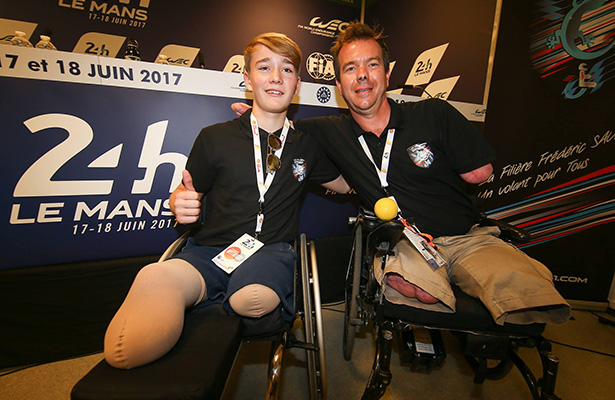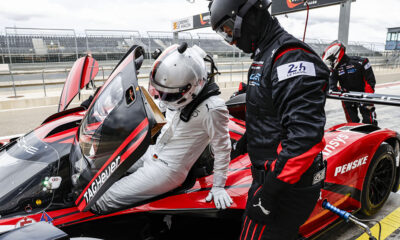Less than three months since losing his lower legs in a British Formula 4 race at Donington Park, 18-year-old Billy Monger has revealed he will be making his racing return in a specially-prepared car for the VdeV season finale at Estoril in November.
The news came at a press conference announcing the creation of La Filiere Frederic Sausset, a driver academy aimed at creating a driving lineup made up exclusively of disabled drivers for the 2020 24 Hours of Le Mans.
Sausset, the project’s founder and namesake, is a quadruple amputee who made his Le Mans debut last year. Monger will join Sausset and Christophe Tinseau for the race at Estoril, and said he has already begun preparing for the event.
“I’m carrying on my physical preparations to be back at full fitness,” Monger said.
“Really for me, it’s about learning the systems they have on the car and adapting to it to make sure I’m ready when I return to the car.
“The plan for the first race is to be at Estoril at the end of the year in the VdeV with, Fred, and Christophe as the drivers.
“Hopefully I’ll be ready and fully fit for it. It’s going to be a very tough few weeks of training, adapting to the systems they use, but I think I can do it.”
The young Brit said he hoped to begin testing as soon as possible. He has already spent time in Carlin Racing’s Formula 3 simulator using hand controls, and indicated he had adapted well to the technology.
Monger is the first announced driver of the project, which Sausset said aimed to begin its first driver selection process later this year with an eye on having an all-disabled driver lineup ready to race in the first quarter of 2018, likely in a GT3 car.
Drivers will be able to apply for inclusion in the program in the summer and fall, with a test session planned on the Le Mans Bugatti circuit to follow.
Sausset said the plan is to have multiple classes of drivers over at least three years with an aim of creating a sustainable team.
The project to reach Le Mans in 2020 is still in the planning stages. Sausset indicated that the team had already garnered the support of several sponsors and was in discussions with multiple manufacturers, but added it was too soon to say if the Le Mans bid would be in a prototype or GT car.
What is clear is that Sausset will not be a part of the driving lineup, preferring instead a team manager role, and the program will not be a Garage 56 entry like Sausset’s first foray at Le Mans last year.
“We really want our drivers to be on par with the other drivers,” he said. “We want the car to be [classified]. We don’t want to repeat what we’ve done in the previous year.”
“For now, the objective is to make sure we have a first class and a second class and a third class. We want this to be a long-term commitment and not a one shot.
“Ultimately, we want these drivers to be noticed by regular top teams.”
Monger said Sausset is an inspiration, and he hopes their project has the potential mimic the Paralympics in getting athletes with disabilities to the top of their sport.
“I think it’s a really great idea to get disabled drivers, disabled people, to the top levels of motorsport,” said Monger.
“With the Paralympics, they’re at the high end of they sport, and I think to be able to do that would be great. Fred’s really striving to reach that.
“[Sausset] raised the bar of expectations for disabled drivers and what they can do. We plan to keep on pushing, keep raising the bar, and get more and more competitive.
“We’re not here to be a sideshow, we want to be a part of the main event.”




























